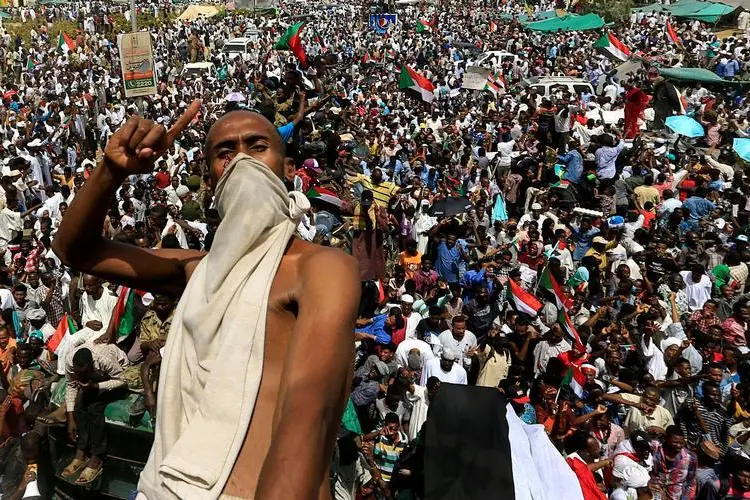PHOTO
CAIRO- As wrangling over Sudan's political future drags on, its economy risks sinking further into disarray, with pledges of assistance from the Gulf expected to provide only short-term relief, say economists.
The mass protests that led the army to topple president Omar al Bashir last month reduced business activity at a time when Sudan needs immediate resources to pay for wheat, fuel and medicines, bankers and other officials told Reuters.
Almost four weeks after Bashir's departure, military leaders are locked in talks with opposition factions and protests groups on how to lead the country into its new dawn.
As they talk, banks say they are still short of foreign exchange to pay off looming commitments, and farmers are searching for supplies for the summer growing season, due to start in a matter of weeks.
Without swift economic and political progress, "public confidence will collapse, the crisis of the banking system will continue and the economic collapse might even worsen" , said Ibrahim Elbadawi, a Sudanese economist and former World Bank employee based in Cairo.
A pledge of $3 billion in aid last month by Saudi Arabia and the United Arabic Emirates (UAE) will provide only a short breathing space, he and other economists added.
The Saudi and UAE support included a $500 million deposit in Sudan's central bank, with the rest going towards fuel, wheat and medicine.
So far, only the UAE has sent money to Sudan, placing a $250 million deposit with the central bank, a Sudanese banker in Khartoum said. He estimated this would cover essentials for one or two months.
Elbadawi said even if the rest of the Gulf money came through, and hundreds of millions of dollars of gold and currency reportedly recovered in the homes of former officials found their way to state coffers, it would not prop up the economy much longer.
"TOUGHER AND TOUGHER"
Any new government that emerges from talks between the army and opposition factions and will face the same problems that brought down Bashir - from unsustainable state subsidies to cash and fuel shortages - while having to manage the public's heightened expectations.
Meanwhile queues for petrol and bank notes have continued. Business has slowed, as manages wait for a clear steer on import policy and foreign exchange.
The economy is also still haunted by Bashir's legacy - the penalties imposed first for his support of militant groups, later for the offensive he launched to crush rebels in the western region of Darfur.
Because Sudan is still listed by the United States as a state sponsor of terrorism and has $1.3 billion of IMF arrears, it is unable to tap the IMF and World Bank for support. Sudanese banks have struggled to re-establish correspondent relationships with foreign banks.
They now need to make efforts to honour the payments, the banker in Khartoum said. "If they lose trust, or contacts with existing correspondents, it's going to be tougher and tougher going forward."
The U.S. has said it will not remove Sudan from the terrorism list while the military holds power.
Sudan's main agricultural season for domestic and export crops starts within weeks, and supplies will be needed, said Mohamed Haroon, a social science professor at the University of Khartoum.
"This is an issue that has to be dealt with in a prompt way by the new government," he said.
The military council said on April 28 it had secured fuel and other inputs for the summer farming season and was working to provide funds to the central bank.
Spending on Sudan's vast security network - both military and paramilitary - is also high.
Elbadawi, who estimated that security and subsidies combined eat up more than 75 percent of the budget, said access to a World Bank programme for demobilising militias would need U.S. support and more financial backing from the Gulf.
But many protesters say they reject Gulf aid because of the influence it could give Gulf states.
"The cost might be high for the handouts we may get from some of the countries of the region," said Haroon.
(Additional reporting by Khalid Abdelaziz in Khartoum Editing by Aidan Lewis and Andrew Heavens) ((patrick.werr@thomsonreuters.com;))





















